18 Jul 2017
Jette Parker Young Artists Summer Performance at Covent Garden
The end of the ROH’s summer season was marked as usual by the Jette Parker Young Artists Summer Performance but this year’s showcase was a little lacklustre at times.

The end of the ROH’s summer season was marked as usual by the Jette Parker Young Artists Summer Performance but this year’s showcase was a little lacklustre at times.
There are plenty of ‘on-a-budget’ opera companies who regularly show that a lot can be made of not very much, so the scanty set and properties in the first-half sequence - a few chairs and tables, a dozen champagne glasses, a bucket of cherries - were not in themselves a problem. Matthew Mulberry’s lighting design was economical and effective. The Byronic gloom of Jacopo Foscari’s prison cell was effectively conjured by a single hanging lamp; Prince Charmant’s palace bathed in a pink glow, while a cooler blue illumed Arabella’s fraught exchange with Mandrynka.
The direction, however, was minimal and too often the singers seemed to be ‘hanging about’ wondering where to move next, singing straight to the house, or into the wings or back-cloth, rather than at or to each other, even though each of the first-half items presents an intimate, charged exchange. The diction was also, generally, poor with almost no discernible distinction between Italian and French.
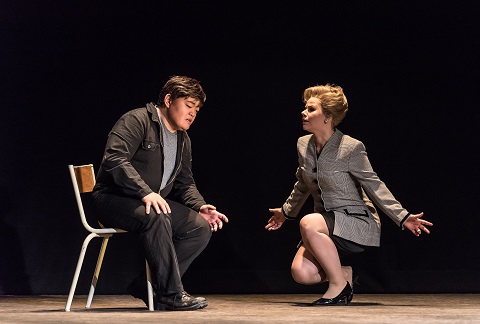 David Junghoon Kim and Vlada Borovko. Photo credit: Clive Barda.
David Junghoon Kim and Vlada Borovko. Photo credit: Clive Barda.
Fortunately, there were several names that have become well-known over the last year or two from their performances in minor roles in the House, and engagements elsewhere, and their appearances in more substantial fare were eagerly anticipated. Opening the programme with the Act II duet from Verdi’s I due Foscari, Vlada Borovko confirmed my previous impression (not least in last year’s JPYA performance and most recently in the ROH’s L'elisir d'amore ) that she is a soprano of dramatic power and commanding presence, well equipped to master Verdi’s surging vocal lines. She was a stirring Lucrezia, comforting David Junghoon Kim’s Foscari when he learns of his exile and conveying the full fierceness of Lucrezia’s love for her husband and fiery scorn for the scheming clique, the Council of Ten. Later, when the ensemble came together for the end of Act 2 of Don Giovanni, Borovko displayed similar concentration and intensity in Donna Anna’s ‘Non mi dir’.
Junghoon Kim’s acting has improved markedly during his time as a JPYA - as his recent engagement with Grange Park Opera confirmed - and here he was convincing as the tortured Foscari who is being tormented by delirious visions of the ghost of the decapitated mercenary, Carmagnola. He sang with clean, appealing tone, though he might have employed a wider dynamic range.
The tenor hasn’t yet quite got the refinement that Rossini’s music calls for and he seemed less comfortable decked up in habit and wimple as ‘Sister Colette’ - the disguised Count Ory who falls into the trap set for him by his page, Isolier, and finds himself in a darkened bedroom making advances to the latter rather than the object of his unwelcome affections, Countess Adèle. Comic timing is not Junghoon Kim’s forte, and it didn’t help that the staging of this trio - which Berlioz described as the composer’s ‘absolute masterpiece’ - lacked a certain jeu d’esprit, the only (mild) chuckles coming from the somewhat clichéd wriggling under the duvet and climbing under the bed.
The trio of singers didn’t ‘play off’ one another with sufficient zip, and conductor James Hendry let the tempo lag, failing to show how the orchestral rhythms point up the dramatic charm and wit. The enunciation of the French text was weak, but there was some attractive singing from Angela Simkin whom I admired in the title role of Oreste at Wilton’s Music Hall in 2016, and who displayed a firm technique and vocal gleam as Isolier. This followed her stylish appearance as Prince Charmant in Massenet’s love-at-first-sight duet, ‘Toi qui m’es apparue’, alongside Kate Howden’s Cendrillon. Howden, standing in at short notice for the indisposed Emily Edmonds, did well to shape Massenet’s lines with simple elegance. She coped well at the top and her fresh sound blended pleasingly with Simkin’s slightly fuller mezzo.
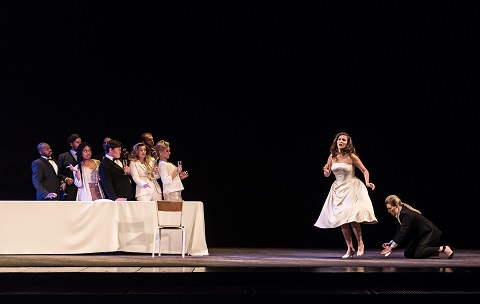 Cendrillon. Photo credit: Clive Barda.
Cendrillon. Photo credit: Clive Barda.
Soprano Francesca Chiejina was the third of Rossini’s comic threesome but she needed rather more vocal presence to communicate Adèle’s impish sense of fun. Chiejina had appeared a little tentative in her earlier guise as Suzel in the ‘Cherry Duet’ from L’amico Fritz - another comic gem which fell rather flat, missing the sparkle which imbues Mascagni’s trifling operetta - and her intonation strayed a little at the start. She has a sweet tone but doesn’t always project with enough dramatic vigour. As Fritz, Thomas Atkins did impress, however. Atkins studied at the Guildhall School of Music and Drama, and when I heard him sing Florindo in the 2015 production of Wolf-Ferrari’s Le donne curiose I remarked his ‘incipient Italianate gleam’, a quality which has now bloomed nicely. His ‘Il mio tesoro’ in the post-interval Don Giovanni episode was the highlight of the evening, revealing a well-supported lyric tenor and an ability to imbue a character who can seem weak-willed and ineffectual with convincing strength and integrity.
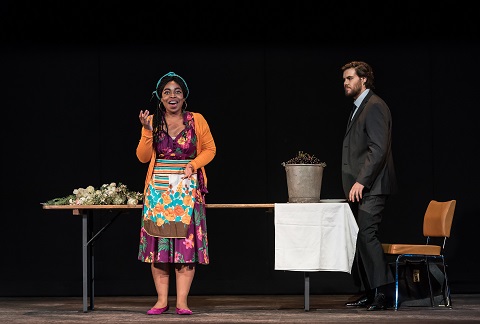 Francesca Chiejina and Thomas Atkins. Photo credit: Clive Barda.
Francesca Chiejina and Thomas Atkins. Photo credit: Clive Barda.
The other first-half item was the final duet from Strauss’s Arabella. As ever with Strauss, the writing lies quite high and Jennifer Davis, as the eponymous aristocrat, scaled the peaks but could not colour them with the requisite silvery tone, and this deprived this exquisite reconciliation scene of its transcendence. A similar heft, and tonal hardness, was apparent in Elvira’s ‘Mi Tradì’.
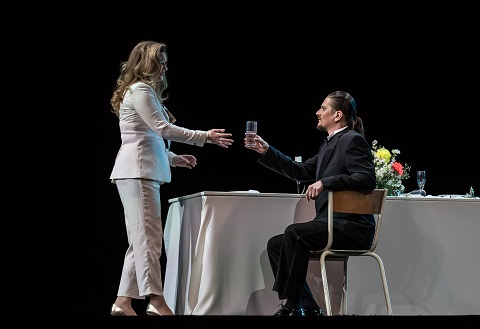 Jennifer Davis and Gyula Nagy. Photo credit: Clive Barda.
Jennifer Davis and Gyula Nagy. Photo credit: Clive Barda.
Perhaps it’s hard to invest the foolish Mandryka with any real credibility but Hungarian baritone Gyula Nagy needed a bit more focus to supplement the warmth of his sound in order to capture the dignity of the close. The absence of a staircase down which Arabella famously glides to her lover - to make the formalised gesture of offering the glass of water that signals her willingness to be her betrothed’s wife - was understandable and forgivable; what was less acceptable, however, was the lack of any convincing engagement between the reunited lovers.
Director Gerard Jones had put more thought and effort into the staging of the final scenes of Don Giovanni, and it paid off, as the simple set - a white-walled chapel where the Commendatore’s ebony coffin served as an unavoidable reminder of the Don’s dastardly deeds and impending doom - brought the singers together with more dramatic involvement and integration. Haegee Lee, who joins the JPYA scheme next season, took the role of Zerlina - intended for Edmonds and acted by Alicia Frost - singing from the side and revealing a good sense of Mozartian style which bodes well for her appearance as Papagena in the ROH’s new staging of Die Zauberflöte, directed by David McVicar, in the autumn. Simon Shibambu was a stentorian Commendatore but softened his tone effectively when doubling up as Masetto. Gyula Nagy was a fittingly disreputable Giovanni, and interacted well with David Shipley’s rich-hued Leporello.
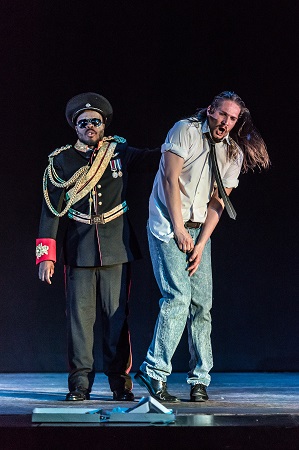 Simon Shibambu and Gyula Nagy. Photo credit: Clive Barda.
Simon Shibambu and Gyula Nagy. Photo credit: Clive Barda.
This staging gave Don Giovanni the last laugh. After the moralising finale and departure of the ‘victors’, the coffin in which Giovanni had been entombed raised its lid, and the chancer seized his opportunity, scampering off with a look which hinted, ‘I’ll be back’. So, too, will many of these young singers in the forthcoming ROH season, alongside six new Young Artists: Haegee Lee and fellow soprano Jacquelyn Stucker, mezzo-soprano Aigul Akhmetshina, tenor Konu Kim, baritone Dominic Sedgwick and stage director Noa Naamat.
Further details of the ROH autumn season can be found at http://www.roh.org.uk/seasons/2017-18/autumn .
Claire Seymour
Verdi: I due Foscari, Act II (duet)
Conductor - David Syrus; Lucrezia Contarini - Vlada Borovko, Jacopo Foscari
- David Junghoon Kim,
Massenet: Cendrillon, Act II (duet - ‘Toi qui m’es apparue’)
Conductor - Matthew Scott Rogers, Cendrillon - Kate Howden, Prince - Angela
Simkin
Mascagni: L’amico Fritz, Act I (duet)
Conductor: David Syrus, Suzel - Francesca Chiejina, Fritz - Thomas Atkins
Strauss: Arabella, Act III (final duet)
Conductor - David Syrus, Arabella - Jennifer Davis, Mandryka - Gyula Nagy
Rossini: Le Comte Ory, Act II (‘A la faveur de cette nuit
obscure’)
Conductor - James Hendry, Countess Adèle de Formoutiers - Francesca
Chiejina, Isolier - Angela Simkin, Count Ory - David Junghoon Kim
Mozart: Don Giovanni, Act II
Conductor - David Syrus, Fortepiano continuo - Nick Fletcher, Donna Anna -
Vlada Borovko, Donna Elvira - Jennifer Davis, Zerlina - Haegee Lee, Don
Ottavio - Thomas Atkins,Don Giovanni - Gyula Nagy, Leporello - David
Shipley, Masetto/Commendatore - Simon Shibambu, Ensemble - Francesca
Chiejina, Angela Simkin, David Junghoon Kim.
Director - Gerard Jones, Lighting designer - Matthew Mulberry, Movement - Anjali Mehra.
Royal Opera House, Covent Garden, London; Sunday 16th July 2017.